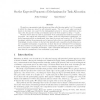Free Online Productivity Tools
i2Speak
i2Symbol
i2OCR
iTex2Img
iWeb2Print
iWeb2Shot
i2Type
iPdf2Split
iPdf2Merge
i2Bopomofo
i2Arabic
i2Style
i2Image
i2PDF
iLatex2Rtf
Sci2ools
114
Voted
PODC
2004
ACM
2004
ACM
On the expected payment of mechanisms for task allocation
We study a representative task allocation problem called shortest paths: Let G be a graph in which the edges are owned by self interested agents. The cost of each edge is privately known to its owner. Let s and t be two distinguished nodes in G. Given a distribution on the edge costs, the goal is to design a mechanism (protocol) which acquires a cheap s − t path. We first observe that the class of generalized VCG mechanisms has desired monotonicity properties. We exploit this observation to obtain, under an independence assumption, expected payments which are significantly lower than the worst case bounds of [2, 4]. We then investigate whether these payments can be improved when there is competition among paths. Surprisingly, we give evidence to the fact that typically such competition hardly helps incentive compatible mechanisms. In particular, we show this for the celebrated VCG mechanism. We then construct a novel general protocol combining the advantages of incentive compatibl...
Compatible Mechanisms | Distributed And Parallel Computing | Incentive Compatible | PODC 2004 | VCG Mechanism |
Related Content
| Added | 30 Jun 2010 |
| Updated | 30 Jun 2010 |
| Type | Conference |
| Year | 2004 |
| Where | PODC |
| Authors | Artur Czumaj, Amir Ronen |
Comments (0)

